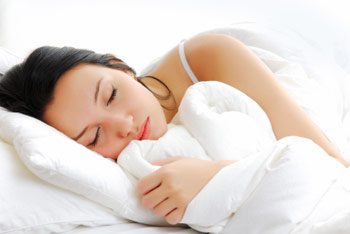Sleep Well
Getting a good night's sleep

At PromoVeritas, we believe that our aim is to ensure that our clients are able to sleep at night – safe in the knowledge that their promotions are being run securely and compliantly.
For those of you who are not yet clients and still want to sleep at nights, we can only suggest some of the following ideas.:
Sleep is one of the most important aspects of our health and general well being. Without the right amount of sleep, our body weakens and the systems inside it slow down. People who lack sleep are also more prone to viral infection and all kinds of sickness. Wrinkles and acne may also occur when there is a lack of sleep. This is because it is in sleep that we regenerate and renew. Thus, it is important to get a restful night's sleep.
During sleep, the body systems slow down in order to prepare for the next day. The mind also relaxes even if it is awake the whole time. This is also the time when the muscles and bones in the body rest and relax, allowing the whole body a chance to repair itself. It is also believed that sleep plays a role in the development and growth of bones and muscles in children. That is why it is essential for everyone to get a restful night's sleep.
Medical doctors advise that to get a restful night's sleep requires at least 8-10 hours. This is the averagenumber of hours of sleep that a person needs to have in order to attain maximum rest and tissue growth.
HOW TO GET A GOOD NIGHT'S SLEEP
The following guidelines are recommended to help you improve both the quality and amount of your sleep.
1. Exercise during the day, preferably in the late afternoon before dinner. Aerobic exercise, or any activity that increases your heart rate, gets you sweating and panting for 20 minutes or more is better, but 45 minutes to an hour of brisk walking will suffice.
2. Go to bed and get up at regular times, even if you're tired in the morning. Don't vary your time of going to bed or getting up. However, if you have consistent sleep problems, then try getting up half an hour earlier in the morning than your usual time; it may help you get to sleep that night.
3. Don't try to make yourself sleep. If you're unable to fall asleep after 20-30 minutes in bed, leave your bed, engage in some relaxing activity (such as watching TV, sitting in a chair and listening to a relaxation tape, or having a cup of herbal tea), and do not return to bed until you're sleepy.
4. Avoid heavy meals before bedtime, but also avoid going to bed hungry. A very small snack about an hour before bedtime may be helpful.
5. Avoid any alcohol consumption or use of other substances in the evening. Avoid moderate-to-heavy use during the day. If you continue to have problems, stop use completely.
6. Reduce caffeine and nicotine consumption as much as possible. If you must have coffee, have it only in the morning and have no more than two cups.
7. Develop a sleep ritual before bedtime. This is some relaxing activity you do every night in the same order at about the same time before you get into bed. Avoid vigorous physical or mental activity and emotional upsets. A hot shower or bath may help you relax.
8. Eliminate non-sleep activities in bed (such as reading or doing other work) to strengthen the association between your bed and sleeping (unless these other activities are part of your sleep ritual.)
9. Avoid napping during the day, unless you want to take a quick "power" nap no longer than 20 minutes and no later than the afternoon.
10. Reduce noise if needed through the use of ear plugs or a noise-masking machine (available at Radio Shack).
11. Keep your room temperature between 60 and 70 degrees.
12. If you can't sleep, do not get too upset; do not fight, resist, or fear sleeplessness. This will make it harder to fall asleep. Figure that the next day you will be somewhat tired but will still be able to do what you need to do.
Adapted from "The Anxiety & Phobia Workbook" by Edmund Bourne, Ph.D.



